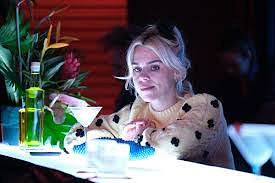On ‘I Hate Suzie,’ Sexual Freedom Is a Fantasy
In “Shame,” the fourth episode of “I Hate Suzie” on HBO Max, the protagonist, Suzie Pickles (Billie Piper), a pop star-turned-actress who’s caught in a public sex scandal, masturbates — for almost the entire episode. Or, rather, she tries to masturbate, but the act isn’t easy; it’s a labor of equal parts determination and frustration, like a frequently benched player hobbling onto the field, already lost.
The episode spends most of its time in Suzie’s head as she twists in bed in her blue leopard-print pajama set, guiding us through her horny dreamscape. It’s a novel place to be, one rarely shown on TV programs. But “I Hate Suzie” was just one of several series in the last year — two others were “I May Destroy You” and “Sex Education” — to examine female desire and conclude that it can never exist in a vacuum; even when it exists in the privacy of the imagination, it is still subject to the intrusion of social norms and expectations.
But such shows reveal more than the symbiotic relationship between female desire and societally sanctioned shame — they show how sex and sexuality are forever tied to female identity and self-image. “I Hate Suzie,” “I May Destroy You” and “Sex Education” know that female sexuality is a trap: We live in a world that simultaneously objectifies and exploits female desire while trying to pretend it doesn’t exist. Society tells us there is no right way to be a woman, but countless wrong ways.
Suzie’s life comes apart when she is the victim of a cyberattack and compromising photos of her are leaked. To make matters worse, it’s clear that the man shown with her, whose face isn’t visible, isn’t her husband; it’s the colleague she’s having an affair with. Each of the eight episodes in the series is named for a stage of grief, and, throughout, Suzie struggles to regain control over her life and figure out what she wants from it, while also nose-diving into more catastrophes.
The series could have just focused on that — the scandal, her TV career and life unraveling. But it understands that in order to fully follow Suzie’s arc from tainted celeb to a woman finally coming to terms with herself and the status of her life, it must take her sexual desire into account. She masturbates imagining several men, always changing, and her best friend and agent, Naomi (Leila Farzad), makes cameo appearances in the guise of a guilty conscience to question and judge Suzie’s sexual proclivities. When Suzie has a car-sex fantasy featuring a random dad from her son’s school, Naomi appears in the back seat, critiquing the reverie: Why that particular act? Why the car? Why him? She accuses Suzie of fantasizing not about her own desires, but rather about what she thinks would please a partner. Even within her own fantasies, Suzie can’t divorce herself from the male gaze.
She would rather dream of herself happily in bed with her colleague, but Naomi chastises her, saying she needs to imagine her husband. Suzie even flashes back to a childhood game of Seven Minutes in Heaven, when she emerges from the closet with a boy to rebukes from the girls around her, who call her a slut.
“Slut” is a refrain in the episode, and encompasses Suzie’s complicated relationship to her desire: She’s turned on by the label at times but also uses it as a weapon against herself because she feels she deserves to be berated. The leaked photos are a scandal primarily because they make public Suzie’s private desire. And female sexuality, “I Hate Suzie” ultimately says, never belongs only to the woman — inside and outside the bedroom, desire belongs to, and is judged by, our male-dominated society.
Suzie is a threat because she breaks the bounds of marriage — an institution that has traditionally granted (and in some cultures, still grants) more power to men — to be with someone she prefers. Ultimately she opts to leave her husband instead of begging his forgiveness, finally able to prioritize her wants over cultural expectations.
On the other hand, how often do we see stories of straight men with full agency over their desire? Constantly. With straight male characters, sex is rarely shown as anything more than an act, a marker of maturity, rather than a situation put upon them with limitations and shameful consequences. Queer narratives, however, are another story, and all three shows use such a subplot as a parallel to the central straight arc. In “Shame,” Naomi, a bisexual character who is always in control and who proudly claims to use sex as a tool to her advantage, is shaken when she’s sexually harassed on a train.
It’s no coincidence that the shows that best captured the nuances of female sexuality last year also depicted sexual harassment or assault. In a world where attacks against women are common, even frequent, women’s sexuality is always shadowed by the threat of violence. (About 1 in 3 women worldwide experience sexual violence, but of course that doesn’t count the assaults that go unreported and also instances of nonviolent harassment.) Another HBO Max series, “I May Destroy You,” takes that as its central premise. In it, Arabella (Michaela Coel), a writer, pieces together her memories of a club night when she was drugged and raped.




